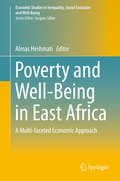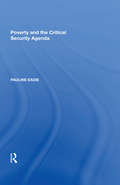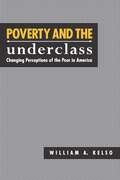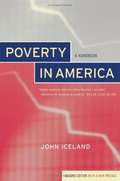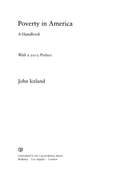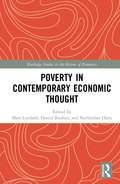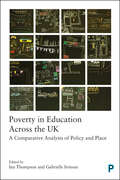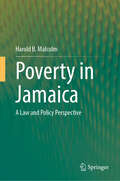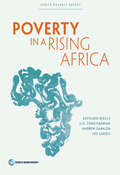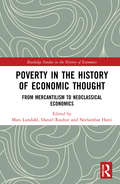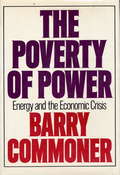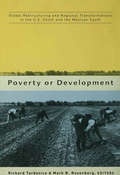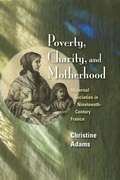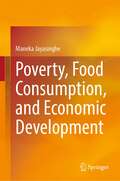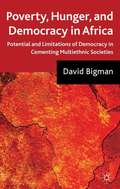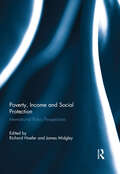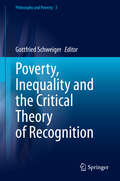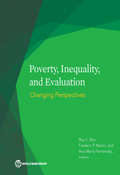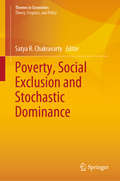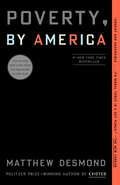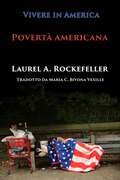- Table View
- List View
Poverty and Well-Being in East Africa
by Almas HeshmatiThis volume is a collection of selected studies on poverty and well-being in East Africa. Using a multidimensional approach, the authors hope to provide a broad view of poverty and a thorough account of the variables that contribute to it. As opposed to traditional studies of poverty, which focus mainly on material well-being, this volume includes criteria such as material standard of living, health, education, housing, personal security, access to information, freedom, participation in organization, corruption, trust, and employment. The studies highlighted in this volume are grouped into the following four research areas: child poverty and malnutrition, dynamics and determinants of poverty, multidimensional measures of poverty, and energy-environment-poverty relationships. Together, these studies provide a comprehensive picture of the state of multidimensional poverty, its measurement, causal factors, and policies and practices in Burundi, Cameron, Ethiopia, Kenya, Madagascar, Malawi, Mozambique, Nigeria, Rwanda and Tanzania. The methodology utilized in the studies is diverse as well, ranging from econometric analysis to decision theory, to neoclassical growth models. This book is geared towards students and researchers interested in economic development, welfare, and poverty in Africa as well as policy makers and members of NGOs and international aid agencies.
Poverty and the Critical Security Agenda (Critical Security Ser.)
by Pauline EadiePoverty and the Critical Security Agenda argues that poverty should be a central concern of security studies and critiques existing methodological approaches to poverty and 'well-being'. Using the Philippines as a case study, this book is critical of approaches to poverty that portray the poor as passive objects as opposed to dynamic actors. With this in mind, the relationship between poverty and democracy, as a means to facilitating human security, is central. Poverty acts as a major behavioural force in international relations, not least for the state, and therefore merits increased visibility within the research agenda. This text is highly relevant for courses on international relations methodology and critical theory, development studies, security studies and international political economy.
Poverty and the Poor
by Gerald LeinwandWhile it is difficult to generalize about the problems of poverty, a number of things are clear. For one thing, while poverty has long been the common experience of man, in a rich society poverty is the leading contradiction of our time. For another, far from being uplifting, as some have thought, poverty is degrading and is a harsh and cruel experience for those who are caught in its grip. It is also clear that we have within our society the means by which the side- effects of poverty may be at least partially reduced, even if poverty itself is not likely to be totally eliminated in the foreseeable future.
Poverty and the Underclass: Changing Perceptions of the Poor in America
by William A KelsoExplains the failure—on both sides of the aisle—of the War on PovertyThe much-heralded War on Poverty has failed. The number of children living in poverty is steadily on the rise and an increasingly destructive underclass brutalizes urban neighborhoods. America's patience with the poor seems to have run out: even cities that have traditionally been havens for the homeless are arresting, harassing, and expelling their street people.In this timely work, William Kelso analyzes how the persistence of poverty has resulted in a reversal of liberal and conservative positions during the last thirty years. While liberals in the 1960s hoped to eliminate the causes of poverty, today they increasingly seem resigned to merely treating its effects. The original liberal objective of giving the poor a helping hand by promoting equal opportunity has given way to a new agenda of entitlements and equal results. In contrast, conservatives who once suggested that trying to eliminate poverty was futile, now seek ways to eradicate the actual causes of poverty.Poverty and the Underclass suggests that the arguments of both the left and right are misguided and offers new explanations for the persistence of poverty. Looking beyond the codewords that have come to obscure the debate—underclass, family values, the culture of poverty,—Kelso emphasizes that poverty is not a monolithic condition, but a vast and multidimensional problem.During his Presidential campaign, Bill Clinton called for an overhaul of the welfare system and spoke of a new covenant to unite both the left and right in developing a common agenda for fighting poverty. In this urgent, landmark work, William Kelso merges conservative, radical, and liberal ideals to suggest how the intractable problem of poverty may be solved at long last by implementing the principles of this new covenant.
Poverty in America: A Handbook (2nd edition)
by John IcelandA broad overview of poverty in the U.S., probing the various ways that it has been measured over time and the evolution of social thinking about poverty. Updated tables and a new preface.
Poverty in America: A Handbook, with a 2012 Preface
by John IcelandPoverty may have always been with us, but it hasn't always been the same. In an in-depth look at trends, patterns, and causes of poverty in the United States, John Iceland combines the latest statistical information, historical data, and social scientific theory to provide a comprehensive picture of poverty in America--a picture that shows how poverty is measured and understood and how this has changed over time, as well as how public policies have grappled with poverty as a political issue and an economic reality. Why does poverty remain so pervasive? Is it unavoidable? Are people from particular racial or ethnic backgrounds or family types inevitably more likely to be poor? What can we expect over the next few years? What are the limits of policy? These are just a few of the questions this book addresses. In a remarkably concise, readable, and accessible format, Iceland explores what the statistics and the historical record, along with most of the major works on poverty, tell us. At the same time, he advances arguments about the relative nature and structural causes of poverty--arguments that eloquently contest conventional wisdom about the links between individual failure, family breakdown, and poverty in America. At a time when the personal, political, social, and broader economic consequences of poverty are ever clearer and more pressing, the depth and breadth of understanding offered by this handbook should make it an essential resource and reference for all scholars, politicians, policymakers, and people of conscience in America.
Poverty in Contemporary Economic Thought (Routledge Studies in the History of Economics)
by Mats Lundahl Neelambar Hatti Daniel RauhutPoverty in Contemporary Economic Thought aims to describe and critically examine how economic thought deals with poverty, including its causes, consequences, reduction and abolition. This edited volume traces the ideas of key writers and schools of modern economic thought across a significant period, ranging from Friedrich Hayek and Keynes to latter-day economists like Amartya Sen and Angus Deaton. The chapters relate poverty to income distribution, asserting the point that poverty is not always conceived of in absolute terms but that relative and social deprivation matters also. Furthermore, the contributors deal with both individual poverty and the poverty of nations in the context of the international economy. In providing such a thorough exploration, this book shows that the approach to poverty differs from economist to economist depending on their particular interests and the main issues related to poverty in each epoch, as well as the influence of the intellectual climate that prevailed at the time when the contribution was made. This key text is valuable reading for advanced students and researchers of the history of economic thought, economic development and the economics of poverty.
Poverty in Education Across the UK: A Comparative Analysis of Policy and Place
by Ian Thompson and Gabrielle IvinsonNuanced interconnections of poverty and educational attainment around the UK are surveyed in this unique analysis. Across the four jurisdictions of England, Scotland, Wales and Northern Ireland, experts consider the impact of curriculum reforms and devolved policy making on the lives of children and young people in poverty. They investigate differences in educational ideologies and structures, and question whether they help or hinder schools seeking to support disadvantaged and marginalised groups. For academics and students engaged in education and social justice, this is a vital exploration of poverty’s profound effects on inequalities in educational attainment and the opportunities to improve school responses.
Poverty in Jamaica: A Law and Policy Perspective
by Harold B. MalcolmThis book examines the genesis of poverty in Jamaica and how policies and laws related to social and economic rights can help with the promotion and protection of human rights as part of a broader worldview of human dignity. It explores the scope of the country’s obligations and capabilities in line with its municipal and international obligations. It sets out through the policy lenses of the New Haven School of Jurisprudence to understand how Jamaica can fulfil these obligations in a meaningful way to impact the daily lives of its people. Through a historical survey to the present-day Jamaica, the exploration uses the theoretical frame of the New Haven School of Jurisprudence which underscores human dignity as being paramount to the attainment of human progress and development. The trajectory of the modern human rights movement and constitutional apparatus of nation states help to reinforce and entrench the ways, standards and norms relating to social and economic rights are observed. This, too, is a consideration for this small island state in the Northern Caribbean. However, the jurisprudential question is how the interpretation of laws, and the implementation of policies can be synchronized as conditioning factors of a global consensus on human dignity especially for the most vulnerable. Socio economic rights underscore a public morality though their potential enforcement is often criticized as too vague and imprecise for lasting or meaningful effect. The New Haven School of Jurisprudence with its emphasis on human dignity in the world community points to a new approach to the egregious human rights violations caused by poverty and the part played by these second-generation rights. The book combines academic rigor with substantial hands-on legal experience, and will be of interest to scholars, practitioners, and policymakers focused on human rights in the region.
Poverty in a Rising Africa
by Kathleen Beegle Luc Christiaensen Andrew Dabalen Isis GaddisPerceptions of Africa have changed dramatically. Viewed as a continent of wars, famines and entrenched poverty in the late 1990s, there is now a focus on "Africa rising ? and an "African 21st century. ? Two decades of unprecedented economic growth in Africa should have brought substantial improvements in well-being. Whether or not they did, remains unclear given the poor quality of the data, the nature of the growth process (especially the role of natural resources), conflicts that affect part of the region, and high population growth. Poverty in a Rising Africa documents the data challenges and systematically reviews the evidence on poverty from monetary and nonmonetary perspectives, as well as a focus on dimensions of inequality. Chapter 1 maps out the availability and quality of the data needed to track monetary poverty, reflects on the governance and political processes that underpin the current situation with respect to data production, and describes some approaches to addressing the data gaps. Chapter 2 evaluates the robustness of the estimates of poverty in Africa. It concludes that poverty reduction in Africa may be slightly greater than traditional estimates suggest, although even the most optimistic estimates of poverty reduction imply that more people lived in poverty in 2012 than in 1990. A broad-stroke profile of poverty and trends in poverty in the region is presented. Chapter 3 broadens the view of poverty by considering nonmonetary dimensions of well-being, such as education, health, and freedom, using Sen's (1985) capabilities and functioning approach. While progress has been made in a number of these areas, levels remain stubbornly low. Chapter 4 reviews the evidence on inequality in Africa. It looks not only at patterns of monetary inequality in Africa but also other dimensions, including inequality of opportunity, intergenerational mobility in occupation and education, and extreme wealth in Africa.
Poverty in the History of Economic Thought: From Mercantilism to Neoclassical Economics (Routledge Studies in the History of Economics)
by Mats Lundahl Neelambar Hatti Daniel RauhutPoverty in the History of Economic Thought: From Mercantilism to Neoclassical Economics aims to describe and critically examine how economic thought deals with poverty and the poor, including its causes, consequences, reduction, and abolition. This edited volume traces the economic ideas of key writers and schools of thought across a significant period, ranging from Adam Smith and Malthus through to Wicksell, Cassel, and Heckscher. The chapters relate poverty to income distribution, asserting that poverty is not always conceived of in absolute terms, and that relative and social deprivation matter also. Furthermore, the contributors deal with both individual poverty and the poverty of nations in the context of international economy. By providing such a thorough exploration, this book shows that the approach to poverty differs from economist to economist, depending on their particular interests and the main issues related to poverty in each epoch, as well as the influence of the intellectual climate that prevailed at the time when the contribution was made. This key text is valuable reading for advanced students and researchers of the history of economic thought, economic development, and the economics of poverty.
Poverty of Power
by Barry Commoner"In the last ten years, the United States--the most powerful and technically advanced society in human history--has been confronted by a series of ominous, seemingly intractable crises. First there was the threat to the environmental survival; then there was the apparent shortage of energy: and now there is the unexpected decline of the economy. These are usually regarded as separate afflictions, each to be solved in its own terms: environmental degradation by pollution controls; the energy crisis by finding new sources of energy and new ways of conserving it; the economic crisis by manipulating prices, taxes, and interest rates. But each effort to solve one crisis seems to clash with the solution of the others--pollution control reduces energy supplies; energy conservation jobs. Inevitably, proponents of one solution become opponents of the others. Policy stagnates and remedial action is paralyzed, adding to the confusion and gloom that beset the country." So opens Barry Commoner's The Poverty of Power, the book in which America's great biologist and environmentalist addresses himself to the central question of our day. He concludes that "what confronts us is not a series of separate crises, but a single basic deficit--a fault that lies deep in the design of modern society. This book is an effort to unearth that fault, to trace its relation to the separate crises, and to consider what can be done to correct it at its root."
Poverty or Development: Global Restructuring and Regional Transformation in the US South and the Mexican South
by Mark B. Rosenberg Richard TardanicoOffers a look at world inequality by comparing the development problems and prospects of southern Mexico and the US South in the context of global restructuring and NAFTA. Both regions have a history and legacy as labour-repressive producers of primary commodities. However, the US South today encompasses poles of considerable wealth and poverty, wh
Poverty, Charity, and Motherhood: Maternal Societies in Nineteenth-Century France
by Christine AdamsThis far-reaching study of maternal societies in post-revolutionary France focuses on the philanthropic work of the Society for Maternal Charity, the most prominent organization of its kind. Administered by middle-class and elite women and financed by powerful families and the government, the Society offered support to poor mothers, helping them to nurse and encouraging them not to abandon their children. In Poverty, Charity, and Motherhood, Christine Adams traces the Society's key role in shaping notions of maternity and in shifting the care of poor families from the hands of charitable volunteers with religious-tinged social visions to paid welfare workers with secular goals such as population growth and patriotism. Adams plumbs the origin and ideology of the Society and its branches, showing how elite women in Paris, Lyon, Bordeaux, Rouen, Marseille, Dijon, and Limoges tried to influence the maternal behavior of women and families with lesser financial means and social status. A deft analysis of the philosophy and goals of the Society details the members' own notions of good mothering, family solidarity, and legitimate marriages that structured official, elite, and popular attitudes concerning gender and poverty in France. These personal attitudes, Adams argues, greatly influenced public policy and shaped the country's burgeoning social welfare system.
Poverty, Food Consumption, and Economic Development
by Maneka JayasingheThis book investigates the relationships between economies of scale in food consumption and a number of socio-economic and demographic characteristics of households and household behavioural choices since food is the major share of household expenditure for poor households. The characteristics considered comprise household size, location, income, and gender of the head of household while the behavioural choices considered comprise the decision to consume home-grown food and the decision to adopt domestic technology to aid food preparation and consumption. The book proposes two theoretical models to rationalize the role of the consumption of home-grown food and the adoption of domestic technology in enhancing economies of scale in food consumption. Econometric models are also used to empirically test the validity of the two theoretical models while adjusted poverty estimations are derived numerically using the estimated equivalence scales. Although data used in applying these techniques are based on four Household Income and Expenditure Surveys conducted by the Department of Census and Statistics (DCS) in Sri Lanka, the methodology can be used for similar analysis in relation to any other country.
Poverty, Hunger, and Democracy in Africa
by David BigmanThe book evaluates alternative policy options for the African countries to overcome the food crisis and the changing structure of world trade to sustain their impressive growth of the early 2000s. These policies must go beyond economic reforms and seek a solution to the entrenched political problems that divided the continent.
Poverty, Income and Social Protection: International Policy Perspectives
by James Midgley Richard HoeferThis book provides insights into the way social protection policy is being redefined as a result of the new commitment by governments around the world to use these programs to reduce poverty. The case studies presented show how innovations in social protection have emerged in different countries. They also discuss various aspects of social protection that will be of interest to readers. While some of the case studies are primarily descriptive and seek to document recent trends in different countries, they also address important social policy issues. Others are particularly topical because they provide useful updates on recent social protection innovations. Countries discussed include Brazil, Britain, Chile, China, Indonesia, South Africa, and the United States. This book was originally published as a special issue of the Journal of Policy Practice.
Poverty, Inequality and the Critical Theory of Recognition (Philosophy and Poverty #3)
by Gottfried SchweigerThis book brings together philosophical approaches to explore the relation of recognition and poverty. This volume examines how critical theories of recognition can be utilized to enhance our understanding, evaluation and critique of poverty and social inequalities. Furthermore, chapters in this book explore anti-poverty policies, development aid and duties towards the (global) poor. This book includes critical examinations of reflections on poverty and related issues in the work of past and present philosophers of recognition. This book hopes to contribute to the ongoing and expanding debate on recognition in ethics, political and social philosophy by focusing on poverty, which is one highly important social and global challenge.“If one believed that the theme of “recognition” had been theoretically exhausted over the last couple of years, this book sets the record straight. The central point of all the studies collected here is that poverty is best understood in its social causes, psychic consequences and moral injustice when studied within the framework of recognition theory. Regardless of how recognition is defined in detail, poverty is best captured as the absence of all material and cultural conditions for being recognized as a human being. Whoever is interested in the many facets of poverty is well advised to consult this path-breaking book.” Axel Honneth, Columbia University.
Poverty, Inequality, and Evaluation
by Ray C. Rist Frederic P. Martin Ana Marãa FernandezThe basic premise of this book is that the conversation on the future of development needs to shift from a focus on poverty to that of inequality. The poverty emphasis is in an intellectual and political cul de sac. It does not address the fundamental question of why people are poor nor what can be done structurally and institutionally to reduce and eliminate it. The various chapters illustrate in the context of various countries and sectors around the world, the significant contributions that evaluators can make in terms of improvement of the analytical framework, analysis of the performance and results of specific programs and projects, as well as assessing and designing better public management systems in terms of poverty and inequality reduction. Beyond the specific contributions presented, three characteristics characterize those evaluations to be relevant for poverty and inequality analysis: a global-local approach: Global to move beyond disciplinary boundaries and consider cross-cutting issues, local to account for the diversity of countries, sectors, institutions and cultures considered; a problem-solving orientation: The issue evaluated is the core focus and determines the choice of evaluation methods to analyze this issue from a variety of angles; an evolutionary approach: Chapters presented are from iconoclasts who do not have any pre-established theory or school of thought to defend. This is the result of openness of mind and ability to adapt the analytical framework, the evaluation methods, and the interpretation of results in a constant interaction with the stakeholders. Such characteristics make evaluation a domain that can help understand better complex issues like poverty, inequality, vulnerability, and their interactions as well as propose a relevant and useful theory of change for public policies and projects to improve the plight of a large part of the world population in industrialized and developing countries alike.
Poverty, Inequality, and Innovation in the Global South
by Oliver MtapuriThis edited volume analyzes the experiences learned in practice especially among small holder farmers to eradicate poverty. In other words, it discusses practical solutions which small scale farmers can use to alleviate poverty and reduce inequality. This addresses the issue of inclusive and sustainability of projects leading to the notion of not leaving anyone behind. The book provides insights that can be translated into policy with potential to inform practice. It also has the potential to address the issue of rural urban migration by providing knowledge that is usable by small scale farmers, policy makers and entrepreneurs alike. The volume is written by authors from different countries, Nigeria, Tanzania, and Zimbabwe, indicating the commonality of the problems of poverty and inequality. It contains insights from all these countries assembled together into an amalgam of practices ready to use and implement informed by evidence from the field as most of the chapters are based on empirical data.
Poverty, Social Exclusion and Stochastic Dominance (Themes in Economics)
by Satya R. ChakravartyThis book honors the memory of Tony Atkinson, who made significant contributions to the rigorous study of income inequality, poverty, and redistribution. These essays presented, covering a span of over 30 years of research and scholarship, have been at the forefront of distributional analysis, and many of them are of prime importance for contemporary developments in the real-valued measurement of poverty and inequality, with particular reference to the concepts of fuzzy poverty assessment, vulnerability, heterogeneity/multidimensionality, unit consistency, sub-group decomposability, and dominance criteria. While all of these articles have been previously published—singly or with co-authorship—in a number of professional journals or distinguished edited volumes, this book is greatly enriched by a substantial introductions by the authors, which place the contributions in context, highlights their inter-connectedness, and relates them to the work of Tony Atkinson and other scholars. This book is of intrinsic value to welfare analysts, as well as being a tribute to a very great scholar by a fellow economist.
Poverty, by America
by Matthew Desmond#1 NEW YORK TIMES BESTSELLER • The Pulitzer Prize–winning author of Evicted reimagines the debate on poverty, making a &“provocative and compelling&” (NPR) argument about why it persists in America: because the rest of us benefit from it.A BEST BOOK OF THE YEAR: The New Yorker, The New York Times Book Review, NPR, Oprah Daily, Time, The Star Tribune, Vulture, The Christian Science Monitor, Chicago Public Library, Esquire, California Review of Books, She Reads, Library Journal&“Urgent and accessible . . . Its moral force is a gut punch.&”—The New YorkerLonglisted for the Inc. Non-Obvious Book Award • Longlisted for the Andrew Carnegie Medal The United States, the richest country on earth, has more poverty than any other advanced democracy. Why? Why does this land of plenty allow one in every eight of its children to go without basic necessities, permit scores of its citizens to live and die on the streets, and authorize its corporations to pay poverty wages? In this landmark book, acclaimed sociologist Matthew Desmond draws on history, research, and original reporting to show how affluent Americans knowingly and unknowingly keep poor people poor. Those of us who are financially secure exploit the poor, driving down their wages while forcing them to overpay for housing and access to cash and credit. We prioritize the subsidization of our wealth over the alleviation of poverty, designing a welfare state that gives the most to those who need the least. And we stockpile opportunity in exclusive communities, creating zones of concentrated riches alongside those of concentrated despair. Some lives are made small so that others may grow. Elegantly written and fiercely argued, this compassionate book gives us new ways of thinking about a morally urgent problem. It also helps us imagine solutions. Desmond builds a startlingly original and ambitious case for ending poverty. He calls on us all to become poverty abolitionists, engaged in a politics of collective belonging to usher in a new age of shared prosperity and, at last, true freedom.
Poverty: Poor People Speak For Themselves (Key Concepts #6)
by Ruth ListerPoverty remains one of the most urgent issues of our time. In this fully updated edition of her important and widely acclaimed intervention on the topic, Ruth Lister introduces readers to the meaning and experience of poverty in the contemporary world. The book opens with a lucid discussion of current debates around the definition and measurement of poverty in industrialized societies, before embarking on a multifaceted exploration of its varied interpretations. Drawing on thinking in the field of international development and real-life accounts, the book emphasizes key aspects of poverty such as powerlessness, lack of voice, insecurity, loss of dignity and respect. Ruth Lister embraces the relational, cultural, symbolic as well as material dimensions of poverty, and makes important links between poverty and other concepts such as capabilities, agency, human rights and citizenship. She concludes by making the case for reframing the politics of poverty as a claim for redistribution and recognition. The result is a rich and insightful analysis, which deepens and broadens our understanding of poverty today. It will be essential reading for all students in the social sciences, as well as researchers, activists and policymakers.
Povertà americana (Vivere in America #2)
by Laurel A. RockefellerIn questa provocatoria analisi storica ed economica, Laurel A. Rockefeller affronta il tema della povertà, spiegando cosa significhi essere poveri negli Stati Uniti e confrontando quest’esperienza con le modalità attraverso cui gli alleati economicamente più evoluti e più stretti dell’America (Canada, Germania, Francia e Regno Unito) si prendono cura dei loro poveri. Dalle condizioni degli alloggi popolari, alla fame ed alla psicologia dei poveri, la Rockefeller va dritta al nocciolo della questione e provvede efficaci soluzioni a tutti i suoi lettori, soluzioni che dovrebbero essere abbracciate da ogni fascia sociale per assicurare il futuro dell’America e garantire un’America sicura ai nostri posteri. Parte prima: saggi che esplorano cinque aspetti della povertà in America: mancanza d’empatia, condiscendenza verso la povertà, derisione dei poveri, alloggi popolari e cultura dello stupro. Parte seconda: analisi che fornisce soluzioni su come affrontare i precedenti aspetti della povertà, al di là dei limiti d'età. Parte terza: uno sguardo della situazione dei poveri e le politiche in atto per fronteggiare il problema in Germania, Francia, Canada e Regno Unito. Analisi comparativa con questi alleati degli USA e l’impatto della povertà sulle politiche estere e la sicurezza nazionale. Le fonti sono tratte da: American Express, Forbes, CNN Money, The New York Times, Feeding America, The Shriver Report, Herald Scotland, BBC News, The Joseph Roundtree Foundation, The Huffington Post, e The Toronto Star.
Power
by Donald SavoieIn this informative critique of contemporary leadership, renowned political scientist Donald Savoie poses and answers the crucial questions: where is power located, and who is in charge? In recent years it has become extremely difficult to pinpoint the location of political and economic power, making it complicated to determine who is to blame for political and economic catastrophes and leading to increased disenchantment with Western politicians and bureaucrats. Power considers how forces such as globalization, the new media, the changing role of the courts in parliamentary democracies, the partisanship of political parties in shaping policy, and collapsing boundaries between governments and within government departments have caused citizens to feel their countries are less democratic. Savoie argues that power is leaving institutions and organizations and going to powerful individuals in both the public and private sectors, who often push aside formal processes in order to drive change.
